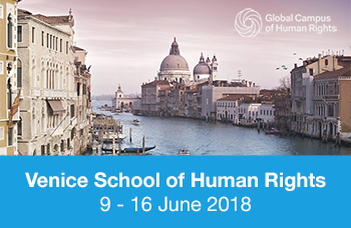Venice School of Human Rights

The Programme
After a first common session, participants will be divided in the three thematic clusters following the choice made upon enrollment. Clusters will focus on Business & Human Rights, Human Rights Defendersand Women, Peace and Security.
Cluster on Business & Human Rights: recent trends and developments
Under the leadership of Giulia Di Tommaso, an international lawyer with over twenty years of global experience in Legal and Public Affairs on a wide range of business issues, the course explores the interdisciplinary components of the Business and Human Rights agenda and provides thoughtful insights on the most recent developments from experts representatives from Academia, International Organizations and Institutions (EU, UN, FAO, OECD), and the private sector
Cluster on Human Rights Defenders
Under the responsibility of George Ulrich, Program Director of the European Master in Human Rights and Democratization (EMA), the cluster on Human Rights Defenders will review a cross-section of instruments, policies and coordination mechanisms that have been devised to protect and facilitate the work of human rights defenders. It will also explore possibilities for reinforcing the work of human rights defenders through a targeted engagement with international, regional and national human rights mechanisms as well as civil society organisations operative in areas intersecting with the work of local human rights defenders giving particular attention to contexts of imminent threat to human rights, notably conflict and post-conflict situations and situations of repressive governance, as well as sexual and gender-based violence.
Cluster on Women, Peace and Security in a growing extremist and militarised world: Agenda, implementation gap and the transformative approach & potential of CEDAW
The cluster under the leadership of Kalliope Agapiou-Josephides, Chairperson of the European Institute for Gender Equality (EU Agency) and former Vice-President of the European Inter University Centre for Human Rights and Democratisation will provide a state of the art critical appraisal on the Women, Peace and Security agenda in a growing extremist and militarised world and stimulate reflection on achievements, key challenges and ways ahead. Participants will have the opportunity to refine their knowledge on both empirically and theoretically informed analyses and highly benefit from discussions with experienced field activists, leading scholars and world-class decision-makers.
Opening and Closing Lectures
The Opening Lectures of the School will be held by Manfred Nowak, EIUC Secretary General and Dalia Leinarte, Chairperson of the CEDAW Committee. Manfred Nowak, Professor of international law and human rights at the University of Vienna, has been the United Nations Special Rapporteur on Torture and member of the United Nations Working Group on Enforced or Involuntary Disappearances. Dalia Leinarte, Professor of Family History at Vilnius University is the Director of the Gender Studies Centre at Vilnius University and Member of the working group for Action Plan for the Implementation of UN Security Council Resolution 1325 on Women, Peace and Security.
The Closing Lecture of the School will be held by Ambassador Mara Marinaki, the Principle Gender EEAS Advisor on the Implementation of UNSCR 1325 on Women, Peace and Security. Ambassador Mara Marinaki is a law graduate from the University of Athens, and holds an LL.M in International Law from the Aristotelian University of Thessaloniki.
Early Bird: 15 March 2018
Registration deadline: 23 April 2018
Course dates: 9 – 16 June 2018
Target: The Venice School is addressed to graduate students from all academic backgrounds, students from the different regional masters in human rights and democratisation, to E.MA alumni as well as to human rights practitioners willing to deepen and improve their knowledge in human rights issues.
For more information, contact us at chra@eiuc.org or visit https://eiuc.org/school

